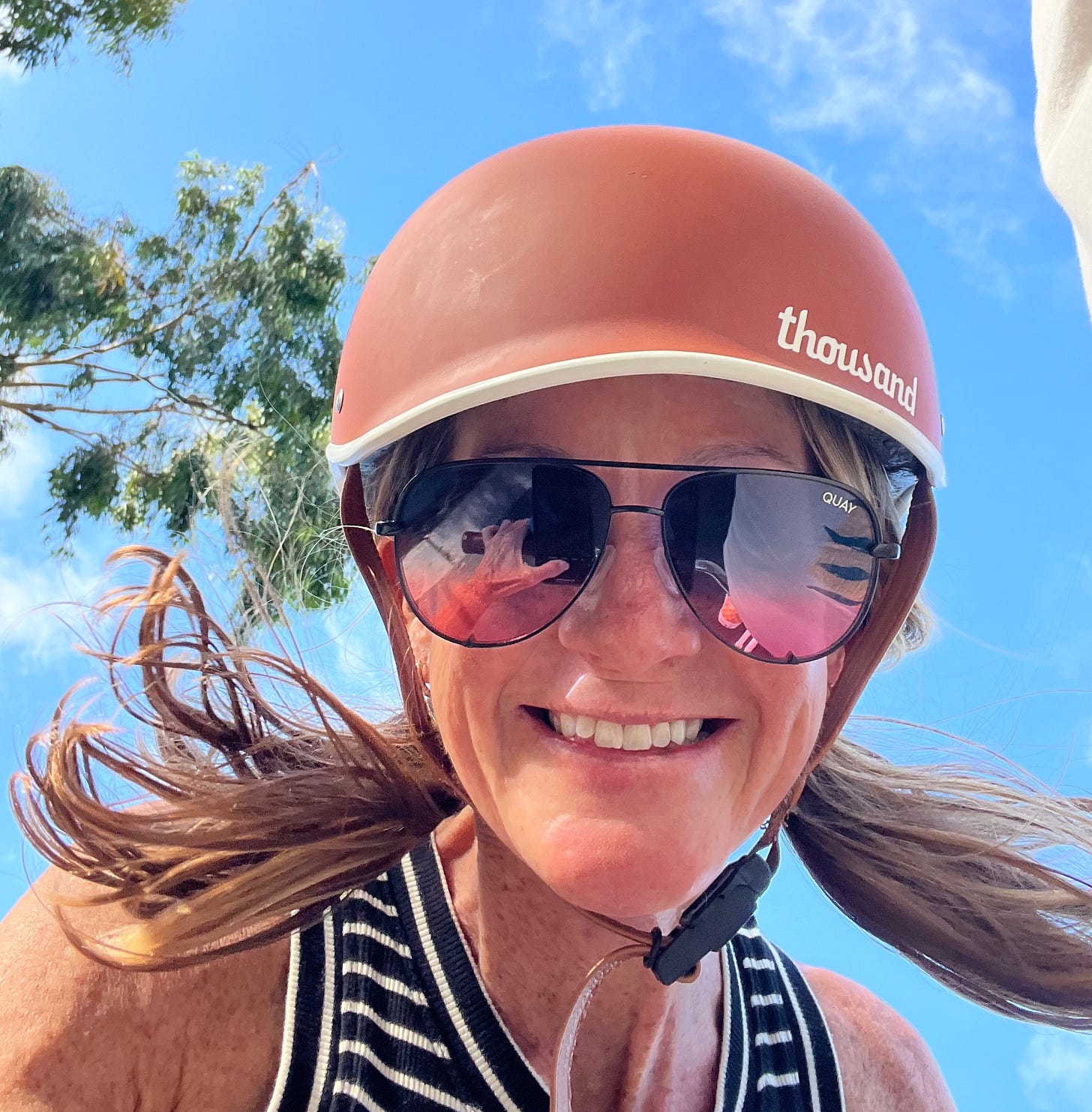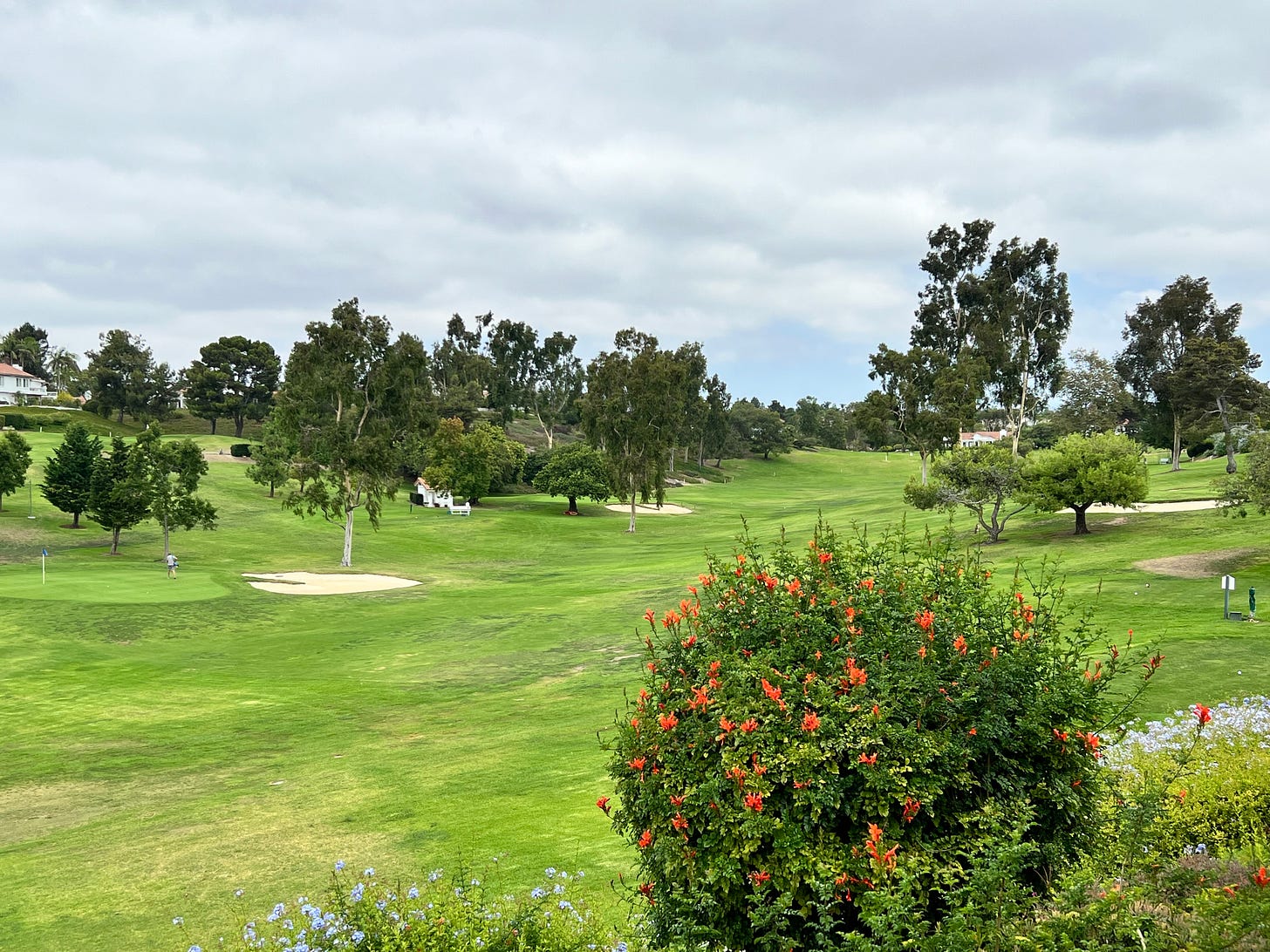Good Morning!
So happy to have you here! Thanks for taking some time out of your day to read The LIFT and to connect with our collective community as we try to live just a little more intentionally and joyfully every week.
Because let’s be honest - we live in a world that doesn’t make that easy!
Welcome to The LIFT
Let me know you were here by clicking the little ❤ , leaving a comment + sharing it with your friends! If you haven’t subscribed, click the “Subscribe Now” button below for a weekly pick me up. A new issue comes out every Sunday + will be delivered right to your inbox. You can read previous issues here.
GOODBYE SUMMER
Today is the first day of fall.
I always lament the end of summer because I thrive off of sunshine. I am energized by being outside, blue skies, warm weather and long days. Solar powered!
I don’t like dark, cold or gray. It affects my energy and outlook. I have to be more intentional about making sure I get my Vitamin D and time outdoors as we shift into the fall season.
One of the benefits of living in San Diego, California for someone like me is that the seasonal changes are subtle. But that can also be a challenge because it’s easy to disregard those subtle changes as they take place.
It’s getting dark earlier. It’s staying dark longer into the morning. It’s cooling off at night. I’m getting reacquainted with my long-sleeved shirts that have been tucked away all summer.
Just because it’s subtle, doesn’t mean it’s not impactful.
The seasonal shifts that take place in nature also take place in us.
In every breath, every heartbeat, there exists an unseen orchestra—a network of life within us connecting us to the world beyond our skin. Zach Bush, MD
As much as we like to think nature is something outside of us - we forget we are part of it. We have gotten ourselves so disconnected from nature and its cycles that we don’t notice how our own cycles change along with our surroundings.
I’ve been reading a fascinating book - The Hidden Life of Trees by Peter Wohlleben. The author is a forester and shares the science of how trees communicate, feel, and live in social networks. The trees in forests are like families - they nurture each other, protect each other and share nutrients.
It’s truly mind-blowing. It’s been such a trip traveling into the world of trees through this book. Learning how all of the different micro-organisms, bacteria and fungi play their role and work together to support the forest.
I will never look at a tree the same again.
As I look out my window at the very orchestrated selection of trees scattered over the golf course, I think about how these displaced and mismatched plants are making the best of their environment and finding ways to survive in what is anything but a natural environment.
Much like us as humans.
We have removed ourselves so far from our natural environment that we don’t even recognize the struggle we have created for ourselves just by living in our orchestrated world.
Nor do we recognize our innate nature - to thrive, connect, share and express our unique beauty together as a forest.
Connection is the foundation of health.
Instead, we think we are separate. Alone. Competing. Distrustful. The heart of chronic disease.
If we could just recognize how our environment creates and fosters this disconnection and that it’s not our natural state...maybe then we could find ways to rebuild and nurture those networks that connect us back to the intelligence of nature.
Does that sounds a little ‘woo woo’ to you? Or does it resonate at some level? Maybe your gut?
GUT WRENCHING
There is an epidemic of loneliness right now - in a world where we are supposedly more ‘connected’ than ever before.
We are like the random trees growing on the golf course in my backyard. They have all of the water, fertilization and professional care they could possibly need, but they are missing their natural environment - the forest - and the ancient dialogue that connects all life on Earth.
More and more we are learning about the importance of the microbial world and how it impacts the direction of our health. Different bacteria carry different messages to our cells - much like the forest floor and how the trees communicate with each other through the microbial network that surrounds them.
Meanwhile, we have created an environment that kills off so many of the bacteria that are vital to our well-being. We have disrupted our gut health in our pursuit of ‘anti-bacterial’. We’ve created products with long shelf lives through the use of preservatives. We’ve introduced chemicals into our everyday products that disrupt our microbiome and interfere with the dialogue between various organisms.
And, we feel it in our gut…disconnected.
We’ve gotten away from the intelligence of nature.
Again, back to the trees on the golf course…doing their best to grow in an artificial environment. Disconnected from the forest floor.
I heard a fascinating fact about the connection between antibiotics and depression this week.
A 2015 study in The Journal of Clinical Psychiatry found a striking correlation: a single course of antibiotics can increase the risk of depression by 24% within a year, and a second course raises it to 54%. This isn’t just about chemical imbalances; it’s the body’s response to a deeper disconnection from the network of life within. Zach Bush, MD
Think about that for a moment.
The disconnect from the network.
On the flip side, I was reading another article about the growing health concern with antibiotic resistance.
The authors of the study forecast a nearly 70 percent increase in deaths due to antimicrobial resistance from 2022 to 2050 with older people most at risk and driving the rise in fatalities. Such resistance, also known as AMR, occurs when microbes, such as bacteria and fungi, evolve in a way that makes them harder to kill with existing medications.
As someone in her mid-fifties it was particularly disturbing to read:
Their findings also suggest that the burden is not equally distributed. From 1990 and 2021, children ages five and younger saw a greater than 50 percent decrease in AMR deaths, while seniors ages 70 and older saw an increase of more than 80 percent.
The authors predict that such deaths among children will continue to decline, halving by 2050, but will double among seniors over the same period.
So interesting, isn’t it?
SUPPORTING GUT HEALTH
Gut health is the new frontier in medicine. From diagnosing to treating and preventing disease, the gut microbiome is the link we have been missing and are seeking to better understand.
What I find so fascinating is how the epidemic of loneliness corresponds with this disconnection in our microbiome - and ultimately with nature.
Supporting our gut health and recognizing our own true nature so we can fill the gaps in our environment and start to reconnect with that intelligence and wisdom that brings all of life together…is probably one of the best things we can do - not only for our health, but for the health of every living thing around us.
Because it is ALL connected. Or is trying to be.
If you want to understand your own gut health better, I highly recommend you check out the book I’m reading about trees. I’ve included a link in the resources section below. It will help you see nature and how to protect it in new ways.
Meanwhile, there are some simple things you can do to improve and protect your gut microbiome in everyday life:
Eat a Diverse Range of Foods: Incorporate a variety of fruits, vegetables, whole grains, and legumes to nourish different bacteria.
Include Fermented Foods: Add yogurt, kefir, sauerkraut, kimchi or miso to your diet for beneficial probiotics.
Increase Fiber Intake: Focus on high-fiber foods like beans, lentils, nuts, seeds, and whole grains to promote healthy bacteria growth.
Limit Processed Foods: Reduce intake of sugary snacks and processed foods that can negatively affect gut health.
Stay Hydrated: Drink plenty of water to help maintain a healthy mucosal lining in the intestines and support digestion.
Manage Stress: Practice relaxation techniques like meditation, yoga, or deep breathing to help reduce stress, which can impact gut health.
Get Regular Exercise: Physical activity can promote the growth of beneficial gut bacteria, so aim for regular exercise.
Prioritize Sleep: Aim for consistent, quality sleep to support overall health and gut microbiome balance.
Limit Antibiotic Use: Use antibiotics only when necessary, as they can disrupt the balance of gut bacteria.
Consider Prebiotics: Include prebiotic-rich foods like garlic, onions, asparagus, and bananas to feed beneficial bacteria in your gut.
One of my favorite supplements to support gut health, reduce inflammation and boost your immune system is i01 ORAC & Camu Camu Olive Leaf Concentrate. And, I especially love that it comes from a grove of eco-certified mountain olive trees in Spain that have been growing without the use of pesticides for over 60 years using biogenerative farming. You will notice improvements to your health quickly with this simple extract. If you have questions about it, reach out to me.
We can reconnect with our true nature if we take a moment to acknowledge where we are standing and what we are listening to.
YOUR MISSION:
This week, in honor of the changing season, I challenge you to notice the trees around you. Nothing better illustrates the change of seasons than the trees. Notice the base of the trees. The surrounding plants. Whether natural or landscaped. Just notice them.
And then, allow yourself to notice the connection you share - deep in your gut.
It’s there - connecting the dots.
What’s one thing you can do this week to support that intelligence you feel in your gut?
RESOURCES:
READ: The Hidden Life of Trees | Peter Wohlleben.
READ: Antibiotic resistance could lead to millions of deaths by 2050 if left unchecked | The Washington Post
WATCH: Enjoy this short Instagram post and video from Zach Bush, MD
IN SUMMARY:
Some cultures have rituals to honor the changing seasons, but for most of us - we blaze right past these pivotal moments of transition. And in doing that, we miss the subtle changes, the quiet wisdom that nature carries not only around us, but IN us.
Let’s slow down for a moment today to acknowledge the end of a season and the start of a new one. However subtle it might be.
Our path forward lies in nurturing our relationship with the microbial universe. This relationship holds the key to our mental, physical, and spiritual well-being—a reconnection to the profound intelligence of nature flowing through our veins.
Take a moment to reflect. In the quiet spaces between breaths, can you feel that life within you? This living system, in its delicate dance, is not separate from you. It is you.
How might you honor this inner world, allowing it to heal, to communicate, and to remind you of your inherent place within the living pulse of existence? Zach Bush, MD
See you next week?
Meanwhile, reach out to me anytime!
Karen Friend Smith
Certified Health Coach & Environmental Health Specialist
karen@itmaybemenopause.com
Instagram: @itmaybemenopause







Thank you Karen for this informative article!
Similarly related to your topic, I was fascinated to watch a PBS Television program entitled “The Brain Gut Connection with Dr. Emeran Mayer” with the suggestion of “powerful interventions” we can all do to improve our microbiome health as well as our emotions. Dr. Mayer has authored many books and I plan to add one to our library!
This is probably my favorite of all of your writings and really resonates! Thank you